The Entrepreneur
Paul Mburu Muthumbi: Building Kenya’s Mbukinya Bus Empire
Mbukinya faced tough early challenges: stiff competition, unreliable drivers, and high operating costs. Fuel price hikes and maintenance expenses cut into profits, and banks hesitated to fund small, high-risk PSV businesses. ‘There were days I doubted my choice,’ Paul Mburu recalls, ‘but I believed hard work would pay off.’”
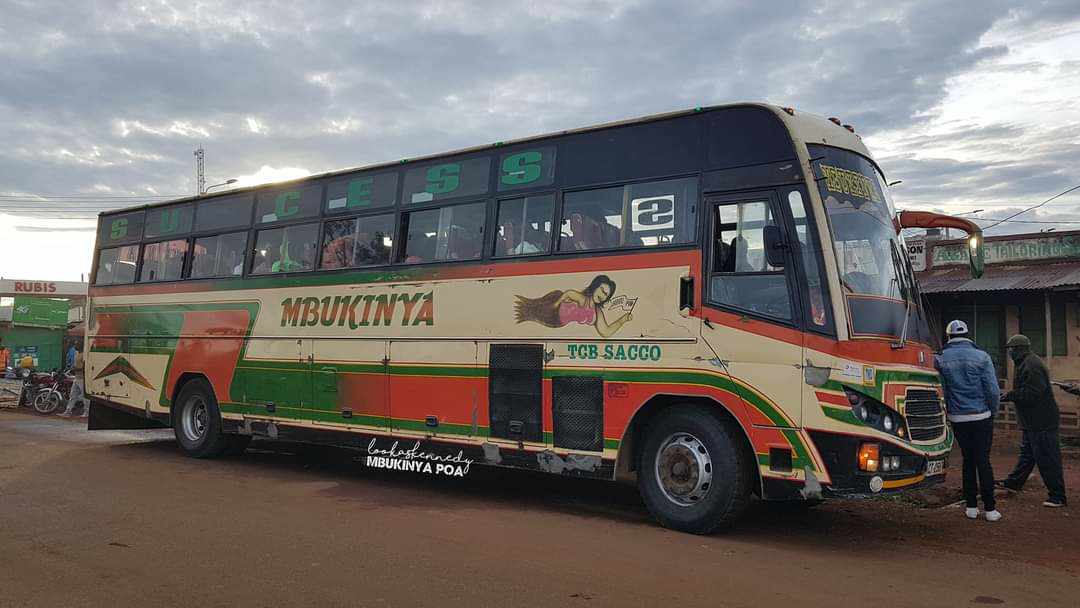
Born and raised in Limuru, Kiambu County, Paul Mburu Muthumbi, now 90, has lived a life that exemplifies resilience and determination.
His story is not just one of personal triumph, but also a testament to the power of persistence in the face of adversity.
As a young man, Paul was passionate about the public transport sector, inspired by the buses that passed through his village. “I always knew I wanted to be involved in transport. I just didn’t know how,” he says.
In 1952, after completing his final exams, Paul found himself navigating the difficult job market.
In 1992, armed with little more than determination, Paul began hawking eggs in Nairobi’s busy streets, trying to make ends meet. “I knew that if I worked hard and kept my eyes open for opportunities, I could eventually do better,” he recalls.
It was in these early years of struggling in the informal sector that Paul learned crucial lessons about customer service, managing a small business, and the importance of reinvestment. “I used every penny from selling eggs to save for the next big step,” Paul explains.
Adding, “It wasn’t easy, but I knew that if I worked hard and kept my eyes open for opportunities, I could do better,” he recalls. Over the next 11 years, Paul saved KSh 6,000, which he used to invest in his first bus—a second-hand vehicle that would mark the beginning of his journey in the public transport sector.
The Birth of Mbukinya in 2000
In 2000, after nearly a decade of honing his entrepreneurial skills, Paul saw a potential opportunity in the public transport sector.
Nairobi, the capital city of Kenya, had a growing population, and reliable transportation services were in short supply. Recognizing the gap, he decided to take a bold leap and venture into the PSV industry.
With a small loan from a local microfinance bank, Paul bought his first second-hand bus.
The vehicle cost him KSh 800,000, an amount he managed to secure through a personal guarantee and a strong relationship with the local bank. “I didn’t have much collateral, but my reputation from my small egg business helped me convince the bank to lend me the money,” he says.
Paul registered Mbukinya, a name inspired by his family, and launched the business with a single bus operating on one route in Nairobi.
The early days were tough, with the bus struggling to fill seats and competition from well-established PSV companies. “The first few months were the hardest,” Paul admits.
“The industry was full of players, and many were set in their ways. But I believed in offering better service, and that’s how we started to build our reputation.”
Overcoming Early Challenges
The road ahead was fraught with challenges.
Mbukinya’s initial struggles included fierce competition, unreliable drivers, and high operational costs.
Paul recalls how fuel price fluctuations and maintenance costs often ate into the company’s meagre profits. “There were days when I wondered if I’d made the right choice. But I knew that with consistency and hard work, we could turn things around,” he says.
One of the biggest hurdles Paul faced was a lack of financing to expand his fleet.
In Kenya, many banks are reluctant to lend to new and small businesses, especially in the transport sector, which is viewed as high-risk.
“It was hard to get financial support from banks. They didn’t see the potential in PSV businesses back then,” Paul explains.
However, through persistence, he managed to secure another loan in 2003 from a local bank, this time amounting to KSh 1.5 million (US $.11,27.91).With this loan, he expanded his fleet to three buses.
“The key was to prove that I could repay the loans,” he says. “I made sure that Mbukinya’s buses were always well-maintained and on time. Punctuality became our trademark.”
Building a Reputation and Expanding the Fleet
By 2005, Mbukinya began to gain traction. Paul focused on customer satisfaction, ensuring his buses were clean, his drivers were professional, and the schedules were strictly adhered to.
“A happy passenger is a loyal passenger,” Paul reflects.
This commitment to service quickly paid off, and soon, the buses were consistently full, with more customers opting for his service over competitors.
To further build the company’s reputation, Paul expanded Mbukinya’s services to other major towns in Kenya.
By 2010, the company had expanded its fleet to 10 buses.
He used the profits from his expanding fleet to invest in modernising the buses, replacing older vehicles with newer, more fuel-efficient models. This move helped reduce operational costs, making the business more profitable.
In 2012, Mbukinya hit another milestone when it became one of the first PSV companies in Kenya to introduce an electronic payment system, allowing passengers to pay via mobile money platforms like M-Pesa.
This tech-forward move attracted a new generation of commuters who valued convenience.
Navigating Economic Turmoil and the Role of Banks
As with any business, the road wasn’t always smooth.
In 2015, Kenya’s PSV industry underwent a major regulatory shift. The government introduced new licensing and inspection requirements, which required operators like Paul to invest in fleet upgrades and adhere to stricter safety standards.
“It was a tough time for all of us in the industry,” Paul recalls. “The new regulations meant significant investments in safety equipment and training. But I saw this as an opportunity to differentiate Mbukinya from other operators.”
Despite the financial strain, Paul’s good relationship with banks helped him secure the necessary funding to meet the new regulations.
“The banks saw that we were committed to the business and to complying with regulations. They helped us get through those challenging times,” he says.
In 2018, Paul was able to secure a larger loan to purchase 15 more buses, growing the fleet to over 30 vehicles. His strong ties with financial institutions, built on years of consistent business practices, allowed him to access capital that many of his competitors struggled to obtain.
A Crisis with the Hino Kenya Buses
Despite the steady growth and success, Mbukinya faced a significant setback in 2019. The company had acquired 41 Toyota Hino buses, which had initially seemed like a smart investment.
However, soon after their acquisition, the buses developed severe mechanical problems, causing a major disruption in Mbukinya’s operations. The buses, which were still within their warranty period, posed a serious challenge to the company.
To address the issue, Mbukinya returned the buses to Toyota, who assumed ownership and took on the responsibility of repairing them.
According to Muthumbi, he received KSh 60 million for the buses, but he emphasised that this amount did not fully cover the massive losses the company incurred.
“I had invested billions into those buses, and the repairs took a toll on our finances. It was a huge setback,” Paul explains.
The incident was particularly painful for Mbukinya, as the company had put significant faith in the vehicles, which were expected to bolster the fleet and improve operational efficiency.
The crisis put a strain on Mbukinya’s reputation and finances, requiring both tactical responses and long-term strategy changes.
The Night Ban Controversy
In addition to the challenges with the buses, Paul Mburu Muthumbi also found himself at odds with the National Transport and Safety Authority (NTSA) over the controversial night travel ban.
In December 2013, NTSA introduced a policy restricting public service vehicles from operating between 10 pm and 5 am, citing safety concerns due to accidents during late-night travels.
This decision was met with resistance from several PSV operators, including Muthumbi, who felt that the ban was unfairly detrimental to his business.
“The night ban hit our income hard. Losing those nighttime routes meant a significant drop in revenue,” he explains.
As the chairman of the Kenya Country Bus Owners’ Association (KCBOA), Muthumbi was a vocal critic of the policy.
He even threatened to take legal action to have the ban nullified, arguing that it unfairly affected many small PSV operators who relied on night services to stay competitive.
“We’re being punished for an issue that isn’t fully in our control,” Paul said at the time. “We’ll fight this ban in court if necessary, as it directly threatens our livelihoods.”
These challenges were particularly daunting, but they didn’t deter Muthumbi. Instead, he continued to press forward, proving his resilience in the face of adversity.
His ability to navigate these difficult situations further solidified his reputation as a determined entrepreneur in Kenya’s highly competitive transport sector.
Giving Back and the Road Ahead
Today, Mbukinya operates a fleet of 50 buses, covering multiple routes across Kenya and employing over 200 people.
Paul’s story is a testament to his resilience and vision. Beyond business, he has given back to his community, sponsoring educational programs and offering employment to many young Kenyans.
“I’ve always believed that success isn’t just about making money; it’s about lifting others along the way,” says Paul, who has invested in training programs for his staff and offered financial support to local schools.
Looking to the future, Paul is planning further expansions, with a focus on sustainability.
“I want Mbukinya to be a company that not only leads in transport but also sets the standard for environmental responsibility. We’re looking into green technologies like electric buses in the next five years,” he says.
From hawking eggs to running a transport empire, Paul Mburu Muthumbi’s story shows that with vision, resilience, and a willingness to embrace change, success is always within reach.
She Business
Bethlehem Tilahun Alemu: From Ethiopian Artisan to Global Icon

: Discover how Bethlehem Tilahun Alemu built SoleRebels into a global,
sustainable footwear brand, overcoming challenges and transforming Ethiopian
craftsmanship.
Bethlehem Tilahun Alemu’s story begins in Zenabwork, a modest village on the outskirts
of Addis Ababa, Ethiopia. Growing up, she watched her community struggle with unemployment and poverty, despite a rich heritage of artisanal skills that remained largely untapped.
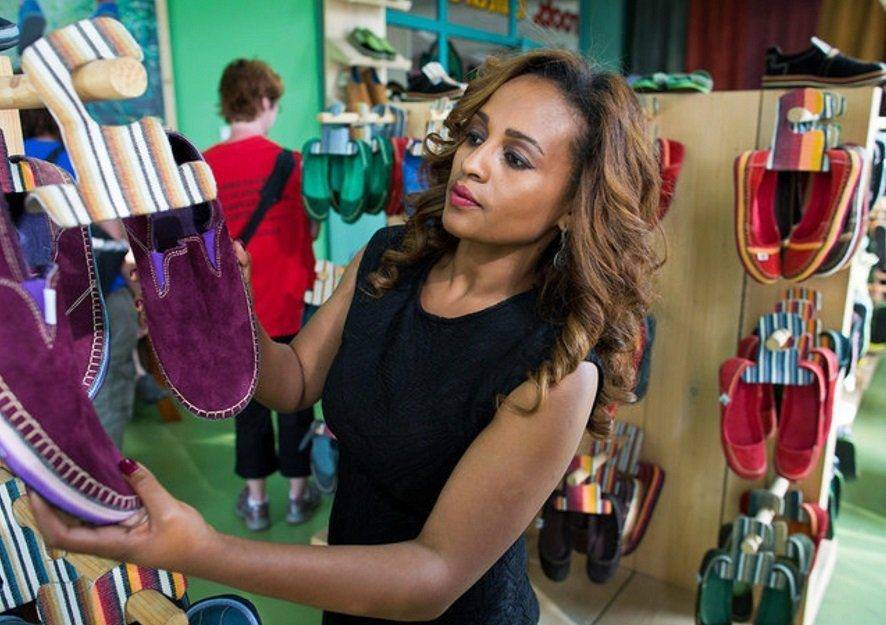
Fueled by determination and a desire to transform her surroundings, Bethlehem
embarked on a journey that would redefine African entrepreneurship and put Ethiopia
on the global map.
Her creation, SoleRebels, isn’t just a footwear brand. It’s a movement—an embodiment
of sustainability, culture, and empowerment.
A DREAM WOVEN WITH TRADITION
In 2005, Bethlehem founded SoleRebels with a simple yet powerful idea: to turn
Ethiopia’s rich artisanal craftsmanship into eco-friendly, globally competitive footwear.
Inspired by traditional “selate” shoes—made from recycled tyres—she envisioned a
brand that blended cultural authenticity with modern design.
She recruited local artisans, many of whom were unemployed, and encouraged them to
innovate while preserving traditional techniques.
Every pair of shoes was a masterpiece, crafted from hand-spun cotton, organic
materials, and repurposed car tyres. Bethlehem’s concept was groundbreaking: a product that told a story while making a global impact.
STARTING FROM SCRATCH
Like many entrepreneurs, Bethlehem’s initial challenge was capital.
With no access to bank loans or large investors, she relied on personal savings and
modest contributions from her family.
Slowly but surely, she built her business, reinvesting profits into training workers and
improving production tools. International grants and initiatives like the SEED Initiative later recognized the potential of her venture, providing additional support.

The early days weren’t easy. Artisans lacked modern tools, and accessing raw
materials was an uphill battle. But Bethlehem, known for her tenacity, tackled these challenges head-on. She developed partnerships with local suppliers to ensure a consistent supply of quality materials and invested in upskilling her workforce.
Breaking into the global market presented another hurdle. Competing against established brands seemed daunting, but Bethlehem found her edge: sustainability and ethical production.
In an era when consumers were becoming eco-conscious, SoleRebels’ ethos of fair wages, recycled materials, and cultural storytelling resonated deeply.
BUILDING A GLOBAL EMPIRE
Fast forward to today, and SoleRebels has a presence in over 30 countries, with
flagship stores in cities like San Francisco, Tokyo, and Barcelona.
It is also the first African footwear brand to be certified by the World Fair Trade
Organization (WFTO)—a testament to Bethlehem’s commitment to doing business the
right way.
Her company directly and indirectly employs over 1,200 people, making it one of
Ethiopia’s largest employers in the artisan sector.
Workers earn more than three times the industry average, a policy Bethlehem takes
immense pride in. “When we pay people well, we don’t just change lives—we transform
communities,” she says.
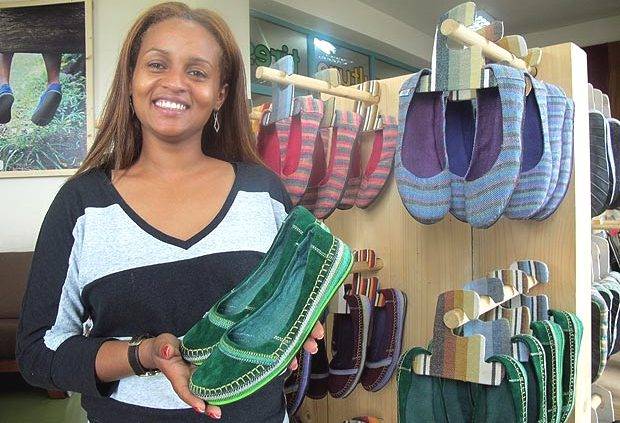
MENTORS AND INSPIRATIONS
Bethlehem often credits her late grandfather, a farmer and community leader, as her
greatest mentor.
His work ethic and deep belief in the power of local communities shaped her vision. She
also draws inspiration from global leaders, including Ethiopian Prime Minister Abiy
Ahmed, whose focus on innovation and economic growth aligns with her goals.
RISING ABOVE CHALLENGES
Bethlehem’s entrepreneurial journey has been marked by resilience. When production
scaled up, she faced supply chain disruptions that threatened deadlines. Her solution?
Cultivate long-term relationships with reliable local suppliers and diversify material
sources.
Entering new markets came with its own set of obstacles. Competing against
established brands requires a unique value proposition.
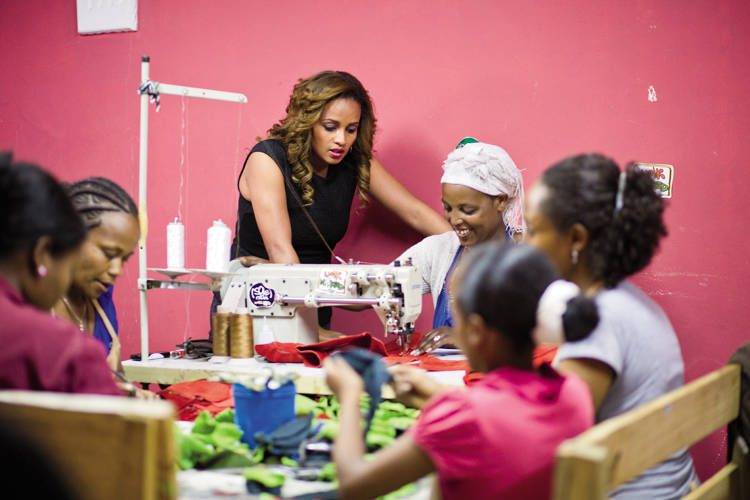
SoleRebels offered more than shoes—it offered a story: a product steeped in Ethiopian
culture, made sustainably, and crafted ethically.
VISION FOR THE FUTURE
Bethlehem isn’t slowing down. Her plans include:
- ● Expanding SoleRebels’ retail presence in Europe and Asia.
- ● Introducing sustainable clothing lines.
- ● Partnering with global brands to promote eco-friendly production in Africa.
Beyond SoleRebels, Bethlehem has a broader mission: to inspire a new narrative for
African entrepreneurship. She wants to show the world that Africa isn’t just a consumer
market but a hub for innovation and excellence.
CONCLUSION: WALKING THE TALK
Bethlehem Tilahun Alemu has redefined what it means to be an entrepreneur. From
Zenabwork’s dirt roads to the global stage, she has shown that success doesn’t come
from resources alone—it comes from vision, grit, and a deep connection to one’s roots.
With SoleRebels, Bethlehem has not only created a thriving business but a model for
how sustainable, ethical enterprises can transform communities. As she continues to
dream big, her footsteps pave the way for the next generation of African changemakers.
She Business
Joyce Akinyi Convicted: Heroin Smuggling Case Exposed

: Kenyan businesswoman Joyce Akinyi faces life imprisonment after being found
guilty of smuggling heroin worth US$ 34,483. Her history with crime has now
unravelled.
Joyce Teresia Akinyi’s story is one of dramatic highs and lows—rising from a successful
businesswoman to being convicted of a large-scale heroin smuggling operation.
With ties to international criminal networks, high-profile relationships, and repeated run-
ins with the law, Akinyi’s life has been marked by controversy and legal battles.
THE HIGH LIFE: BUSINESS AND INFLUENCE
Akinyi first gained prominence as the upscale Deep West Resort owner in Lang’ata,
Nairobi. Known for her affluent lifestyle, she mingled with Kenya’s elite and maintained
significant business interests.
However, behind the glamorous facade lay a darker world of alleged criminal activity.
Her personal life was equally turbulent. In 1998, she met Nigerian businessman Anthony Chinedu, and the couple had two children before formalising their union.
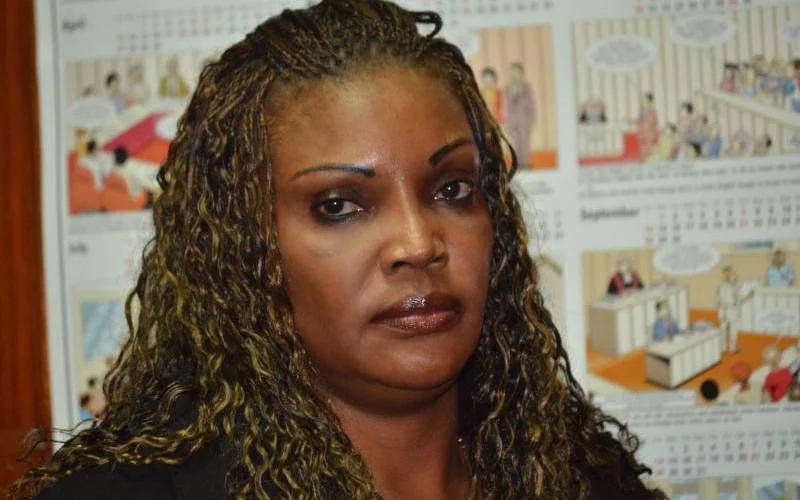
Their relationship was rocky, marked by numerous arrests on drug trafficking charges.
In 2013, Chinedu was deported from Kenya after authorities seized drugs in his
possession, a move that further exposed Akinyi to public scrutiny.
A HISTORY OF LEGAL TROUBLES
Over the years, Akinyi faced repeated allegations of drug trafficking. Her name became
prominent in 2008 when she was arrested in New Delhi, India, alongside former
Budalang’i MP Raphael Wanjala.
Authorities detained the pair with undeclared cash worth Sh7.59 million, suspected to
be linked to drug deals. Although released after intervention by the Kenyan government, the incident marked the start of a string of legal troubles for Akinyi.
In 2013, she and Wanjala were arrested again on the Nairobi-Namanga highway with a
suspicious white powder. Although they claimed it was corn flour, suspicions persisted,
and Akinyi’s criminal associations deepened.
THE TURNING POINT: CONVICTION FOR HERION SMUGGLING
Akinyi’s criminal activities reached a dramatic conclusion in 2019 when a police raid on
Deep West Resort uncovered 2kg of heroin worth Sh5 million hidden in a shoe rack.
The Anti-Narcotics Directorate linked the operation to an international smuggling
network coordinated by Akinyi.
The Jomo Kenyatta International Airport Tribunal found Akinyi guilty under Article
4(a) of the Narcotic Drugs and Psychotropic Substances Control Act, which
mandates life imprisonment for drug trafficking.
The court heard compelling evidence, including photographs of heroin wrapped in white
tape, voice recordings coordinating smuggling activities, and the discovery of a Tabita
Digital Scale used to weigh drugs.
Akinyi’s co-defendants, Paulin Kalala Musankinshay and Peres Adhiambo, were
similarly implicated. Evidence also revealed that Akinyi used multiple fake passports, including a Congolese passport in the names of “Mape Marline Kambura” and “Raha Eveline
Kambere,” enabling her to operate under different aliases.
FINANCIAL CRIMES AND ASSET RECOVERY
Beyond drug trafficking, Akinyi’s wealth came under scrutiny. In 2021, she lost two
luxury vehicles worth Sh20 million to the State, deemed proceeds of crime.
Investigations by the Asset Recovery Agency revealed that Akinyi deposited
suspiciously large sums ranging from Sh60,000 to Sh20 million into various bank
accounts. Her real estate investments—villas built and rented out—further indicated
illicit income sources.
THE END OF THE ROAD
On December 10, 2024, Akinyi faces sentencing, which could include life
imprisonment and a Sh5 million fine. Her fall from grace highlights the dangers of
unchecked ambition and illegal pursuits. Magistrate Njeri Thuku, who presided over the
case, dismissed Akinyi’s defence that the drugs were planted by her estranged husband
Chinedu, calling it baseless.
CONCLUSION
From her meteoric rise as a business mogul to her conviction as a drug trafficker, Joyce
Akinyi’s life is a cautionary tale of how power, wealth, and crime can intertwine.
Her story also underscores Kenya’s ongoing battle with drug trafficking and the far-reaching
consequences of organised crime. For Akinyi, the glitz and glamour of her former life
have now given way to the stark reality of justice.
Nb: Exchange rate 1 USD = 145 Ksh
The Entrepreneur
Miss Rwanda 2022, Divine Muheto, Faces Drink-Driving Scandal

: Miss Rwanda 2022, Divine Muheto, was arrested for drink-driving, fined, and
detained after a car crash. She expresses regret and seeks forgiveness for her
actions.
From Beauty Queen to Legal Controversy
Divine Muheto, 21, crowned Miss Rwanda 2022, rose to prominence as a symbol of
beauty and ambition. She always believed she had what it took to achieve her childhood
dream of becoming a beauty queen.
Her journey began after high school when she entered the Miss Rwanda competition,
ultimately claiming the coveted title.
Reflecting on her success, she once said, “When you fear, you can’t make anything
different in life, but when you are fearless, a lot of positive things come your way.”
Legal Troubles in 2024
However, her reign as Miss Rwanda has been overshadowed by controversy. In late
2024, Muheto was arrested following a drink-driving incident in Kigali.

Reports from the Rwanda National Police (RNP) confirmed that she was caught driving
under the influence of alcohol without a valid license, resulting in a crash that destroyed
public infrastructure, including a street light pole and palm trees.
The police also noted that Muheto fled the scene of the accident. She was subsequently
fined 190,000 Rwandan francs (approximately $140) and detained.
This incident marked a troubling pattern, as the beauty queen had previously faced
similar charges in September 2023, when she crashed her car into a building while
driving drunk.
Silent Remorse and Public Engagement
Muheto, the daughter of Assistant Commissioner of Police Francis Muheto, has
remained largely silent in the media following her arrest, though her legal team has
expressed that she deeply regrets her actions and has sought forgiveness.
Despite this, she continues to be a public figure, engaged in various activities. Her legal troubleshave raised concerns, but she remains resolute in her belief that life’s challenges present growth opportunities.

Inspirational Messages and Support System
While her parents have largely stayed out of the spotlight, Divine Muheto has continued
to inspire many young people in Rwanda, emphasising resilience and self-improvement.
She once said, “I knew I had what it takes to the last dot,” and even in the face of
adversity, she strives to move forward, learning from her mistakes and striving to make
a positive impact.
-

 Politics5 months ago
Politics5 months agoFred Okengo Matiang’i vs. President William Ruto: A 2027 Election Showdown
-

 Business & Money10 months ago
Business & Money10 months agoEquity Group Announces Kshs 15.1 Billion Dividend Amid Strong Performance
-

 Politics4 months ago
Politics4 months agoIchung’wah Faces Mt. Kenya Backlash Over Gachagua Impeachment Support
-

 Politics6 months ago
Politics6 months agoPresident Ruto’s Bold Cabinet Dismissal Sparks Hope for Change
-

 Politics7 months ago
Politics7 months agoPresident Ruto’s Lavish Spending Amid Kenya’s Economic Struggles Sparks Outrage
-

 Politics6 months ago
Politics6 months agoJohn Mbadi Takes Over Kenya’s Treasury: Challenges Ahead
-

 Business & Money2 months ago
Business & Money2 months agoMeet Kariuki Ngari: Standard Chartered Bank’s new CEO of Africa. What’s Next?
-

 Politics7 months ago
Politics7 months agoKenya Grapples with Investor Confidence Crisis Amid Tax Protest Fallout





